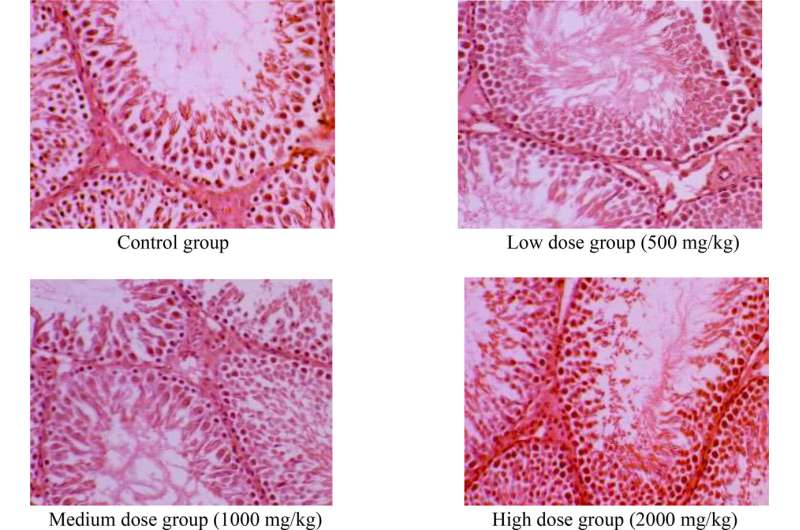June 14, 2023 report
This article has been reviewed according to Science X's editorial process and policies. Editors have highlighted the following attributes while ensuring the content's credibility:
fact-checked
trusted source
proofread
Mucuna pruriens found to both increase and decrease sperm count in the same study

Researchers at the University of Ghana have looked into the efficacy and safety of Mucuna pruriens seed powder on male fertility. In their paper, "Moderate doses of Mucuna pruriens seed powder is safe and improves sperm count and motility," published in Phytomedicine Plus, the team tested various concentrations of Mucuna seed powder on a small sample size of 28 rats.
The 28 Sprague-Dawley male rats were separated into four groups of seven and over 90 days were fed a diet that included Mucuna pruriens in either low dose, medium dose, high dose or distilled water as a control.
Hormonal analyses of the rats showed no statistically significant dose-dependent changes in testosterone, estrogen or follicle-stimulating hormone (FSH). No correlations were found between hormonal levels and semen analyses.
Semen analyses showed higher motility and sperm count with lower immotility in the medium-dose group. A decrease in sperm count was observed in both the low and high-dose groups.
The authors report that the rats exhibited normal weight increases over the 90 days and that Mucuna pruriens do not appear to cause weight increases. This is easily tracked as Sprague-Dawley (SD) rats are widely used model animals whose growth rates are well documented.
In the study data, the control rats began at a significantly lower weight than those receiving the Mucuna test dosages. While the average starting weight of the 21 tested rats was 190.7 g, the seven control rats weighed in at just 147.7 g. No explanation is given, and the reason is unclear.
There is no mention of a randomized sorting of the rats into groups, so it could be selection bias—placing all the runts into the control group. Interestingly, the weight tracks perfectly well with rats at least one week younger, around six weeks old, compared to seven. Either scenario could be a significant enough difference in maturity to negate the effectiveness of using them as a control in a reproductive analysis.
The 90-day end weights are also strange as they are more in line with either nine-week-old male SD rats or 18-week-old female SD rats. No explanation is given, and the reason for the apparent discrepancy is unclear.
Further anomalies can be found in the blood work of the rats, as the control group has nearly half the white blood cell count and other abnormalities consistent with either a younger rat or a female rat. Again no explanation is given, and the low readings are not commented upon.
The authors conclude that their study observed increased sperm count with Mucuna pruriens. The data in the paper they published seems to clarify that they observed higher sperm counts 33% of the time and lower sperm counts 66% of the time compared to a control group with a lower starting weight and no Mucuna pruriens exposure.
More information: Samuel Adjei et al, Moderate doses of Mucuna pruriens seed powder is safe and improves sperm count and motility, Phytomedicine Plus (2023). DOI: 10.1016/j.phyplu.2023.100465
© 2023 Science X Network




















